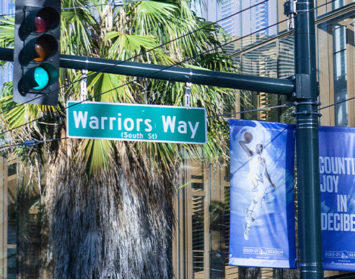I seldom find myself sitting amidst the Sunday afternoon hordes of blue-and-gold painted football fans who yell cheers and invectives at the millionaire players. Nor do I typically spend spring and summer evenings watching squads of adults swing bats at baseballs hurled past them. It just isn’t my thing.
However, I am interested in where hundreds of thousands of San Diego Chargers and Padres fans gather several months each year to watch their sport of choice. So should anyone else who is interested in fostering positive impacts on the region. To that end, I am among Petco Park’s biggest fans. For one thing, it is home to one of 30 Major-League Baseball teams that brings status and untold economic benefits to our region.
Development Playbook
The park brings other benefits. Economic development depends on one or more major catalysts to draw attention to an area and give reasons for other businesses to locate nearby. Petco Park spurred the redevelopment of downtown’s East Village into a world-class urban neighborhood. Earlier, Seaport Village and the San Diego Convention Center created the economic rationale for hotels and other hospitality properties to locate on that part of the bay. The same can be said a few blocks north where, in the mid ’80s, Horton Plaza began to turn a dingy neighborhood of bars and adult entertainment venues into a thriving downtown district.
Now, we have the chance – and I believe the responsibility – to keep another major economic generator and civic status symbol in San Diego by expanding the redevelopment of our downtown even further to accommodate a new stadium for the Chargers.
Even more than Petco Park, a new football stadium would have myriad impacts that would reverberate throughout the rest of the county.
To start with, there are the thousands of construction-related jobs that would be created to build a new stadium – and even more jobs if a recently proposed entertainment and convention center complex is built.
Whatever the final scope of the project becomes, the important must-have component is the football stadium.
It will ensure that the Chargers will remain in San Diego; a tenure that began more than 50 years ago when the old AFL franchise relocated here from Los Angeles. No matter its season records over the years, the Chargers’ presence here has given San Diego added stature as an NFL city.
It’s difficult to measure its impact; only that it’s hard to exaggerate, given the team’s ongoing series of home games each year and the fact that a new stadium would turn San Diego into a regular Super Bowl host venue.
Money Ball
If you don’t think football is an important economic draw elsewhere, just take a look at what some cities are trying to do to capture a NFL franchise. In Los Angeles, the Anschutz Entertainment Group plans to build a $1.2 billion, 72,000-seat stadium and entertainment complex next to the city’s downtown convention center – without a NFL tenant presently in place. One can easily guess who the target franchise is. San Diego must step up to save its team.
However, that’s easier said than done. The loss of a traditional stream of redevelopment revenues puts a project of this scope in serious jeopardy.
The Los Angeles venue has a leg up with a 30-year, $700 million naming rights deal with Farmer’s Insurance to name it Farmers Field. (In comparison, Petco is paying $60 million over 22 years for its local naming rights.)
In short, we need to find financial capital necessary to keep the San Diego Chargers as a major economic catalyst in our region. That begins with political and civic leadership to think boldly about our region’s economic potential and opportunities.
In football lingo, San Diego has the ball. It’s first down and a few hundred million dollars to the goal line.
Jason Hughes is founder of Hughes Marino, an award-winning commercial real estate company with offices across the nation. A pioneer in the field of tenant representation, Jason has exclusively represented tenants and buyers for more than 30 years. Contact Jason at 1-844-662-6635 or jason@hughesmarino.com to learn more.









